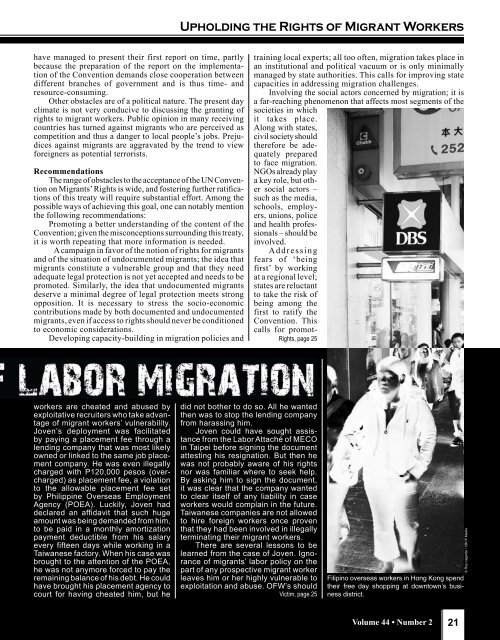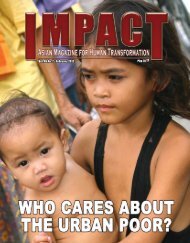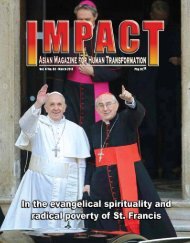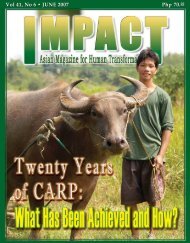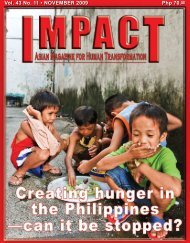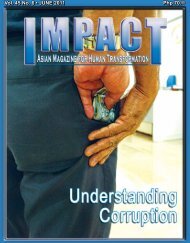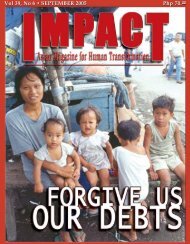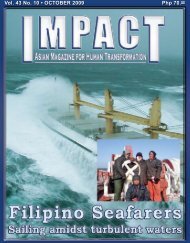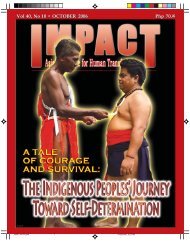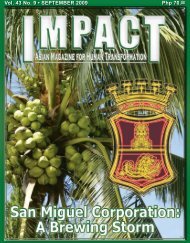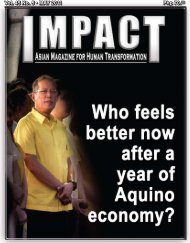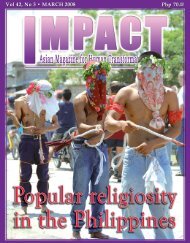Download - IMPACT Magazine Online!
Download - IMPACT Magazine Online!
Download - IMPACT Magazine Online!
Create successful ePaper yourself
Turn your PDF publications into a flip-book with our unique Google optimized e-Paper software.
Upholding the Rights of Migrant Workers<br />
have managed to present their first report on time, partly<br />
because the preparation of the report on the implementation<br />
of the Convention demands close cooperation between<br />
different branches of government and is thus time- and<br />
resource-consuming.<br />
Other obstacles are of a political nature. The present day<br />
climate is not very conducive to discussing the granting of<br />
rights to migrant workers. Public opinion in many receiving<br />
countries has turned against migrants who are perceived as<br />
competition and thus a danger to local people’s jobs. Prejudices<br />
against migrants are aggravated by the trend to view<br />
foreigners as potential terrorists.<br />
Recommendations<br />
The range of obstacles to the acceptance of the UN Convention<br />
on Migrants’ Rights is wide, and fostering further ratifications<br />
of this treaty will require substantial effort. Among the<br />
possible ways of achieving this goal, one can notably mention<br />
the following recommendations:<br />
Promoting a better understanding of the content of the<br />
Convention; given the misconceptions surrounding this treaty,<br />
it is worth repeating that more information is needed.<br />
A campaign in favor of the notion of rights for migrants<br />
and of the situation of undocumented migrants; the idea that<br />
migrants constitute a vulnerable group and that they need<br />
adequate legal protection is not yet accepted and needs to be<br />
promoted. Similarly, the idea that undocumented migrants<br />
deserve a minimal degree of legal protection meets strong<br />
opposition. It is necessary to stress the socio-economic<br />
contributions made by both documented and undocumented<br />
migrants, even if access to rights should never be conditioned<br />
to economic considerations.<br />
Developing capacity-building in migration policies and<br />
training local experts; all too often, migration takes place in<br />
an institutional and political vacuum or is only minimally<br />
managed by state authorities. This calls for improving state<br />
capacities in addressing migration challenges.<br />
Involving the social actors concerned by migration; it is<br />
a far-reaching phenomenon that affects most segments of the<br />
societies in which<br />
it takes place.<br />
Along with states,<br />
civil society should<br />
therefore be adequately<br />
prepared<br />
to face migration.<br />
NGOs already play<br />
a key role, but other<br />
social actors –<br />
such as the media,<br />
schools, employers,<br />
unions, police<br />
and health professionals<br />
– should be<br />
involved.<br />
A d d r e s s i n g<br />
fears of ‘being<br />
first’ by working<br />
at a regional level;<br />
states are reluctant<br />
to take the risk of<br />
being among the<br />
first to ratify the<br />
Convention. This<br />
calls for promot-<br />
Rights, page 25<br />
workers are cheated and abused by<br />
exploitative recruiters who take advantage<br />
of migrant workers’ vulnerability.<br />
Joven’s deployment was facilitated<br />
by paying a placement fee through a<br />
lending company that was most likely<br />
owned or linked to the same job placement<br />
company. He was even illegally<br />
charged with P120,000 pesos (overcharged)<br />
as placement fee, a violation<br />
to the allowable placement fee set<br />
by Philippine Overseas Employment<br />
Agency (POEA). Luckily, Joven had<br />
declared an affidavit that such huge<br />
amount was being demanded from him,<br />
to be paid in a monthly amortization<br />
payment deductible from his salary<br />
every fifteen days while working in a<br />
Taiwanese factory. When his case was<br />
brought to the attention of the POEA,<br />
he was not anymore forced to pay the<br />
remaining balance of his debt. He could<br />
have brought his placement agency to<br />
court for having cheated him, but he<br />
did not bother to do so. All he wanted<br />
then was to stop the lending company<br />
from harassing him.<br />
Joven could have sought assistance<br />
from the Labor Attaché of MECO<br />
in Taipei before signing the document<br />
attesting his resignation. But then he<br />
was not probably aware of his rights<br />
nor was familiar where to seek help.<br />
By asking him to sign the document,<br />
it was clear that the company wanted<br />
to clear itself of any liability in case<br />
workers would complain in the future.<br />
Taiwanese companies are not allowed<br />
to hire foreign workers once proven<br />
that they had been involved in illegally<br />
terminating their migrant workers.<br />
There are several lessons to be<br />
learned from the case of Joven. Ignorance<br />
of migrants’ labor policy on the<br />
part of any prospective migrant worker<br />
leaves him or her highly vulnerable to<br />
exploitation and abuse. OFW’s should<br />
Victim, page 25<br />
Filipino overseas workers in Hong Kong spend<br />
their free day shopping at downtown’s business<br />
district.<br />
© Roy Lagarde / CBCP Media<br />
Volume 44 • Number 2 21


